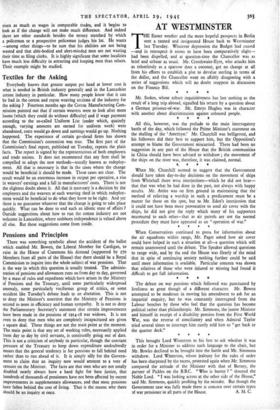Pensions and Principles
There was something symbolic about the accident of the ballot which enabled Mr. Bowen, the Liberal Member for Cardigan, to raise in the House of Commons his demand (supported by 270 Members from all parts of the House) that there should be a Royal Commission to inquire into the whole subject of war pensions. That is the way in which this question is usually treated. The adminis- tration of pensions and allowances runs on from day to day, governed by a mass of rules and expedients which have arisen in the Ministry of Pensions and the Treasury, until some particularly widespread anomaly, some particularly vociferous group of critics, or some accident like Tuesday's debate leads to an alteration. This is not to deny the Minister's assertion that the Ministry of Pensions is second to none in efficiency and human sympathy. It is not to deny the Parliamentary Secretary's statement that certain improvements have been made in the pensions of 1914-18 war widows. It is not even to deny that men who are completely incapacitated are given a square deal. These things are not the main point at the moment. The main point is that any set of working rules, necessarily applied from day to day by civil servants, is continually going out of date. This is not a criticism of anybody in particular, though the constant pressure of the Treasury to keep down expenditure undoubtedly means that the general tendency is for pensions to fall behind need rather than to run ahead of it. It is simply silly for the Govern- ment to claim that an inquiry now would amount to a vote of censure on the Minister. The facts are that men who are not totally disabled nearly always have a hard fight for bare justice, that hundreds of thousands of pensioners have not been affected by recent improvements in supplementary allowances, and that most pensions have fallen behind the cost of living. That is the reason why there should be an inquiry at once.


































 Previous page
Previous page